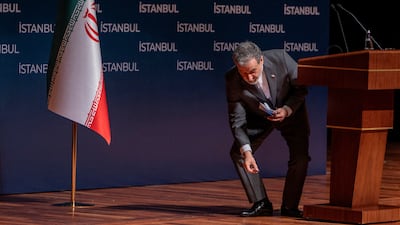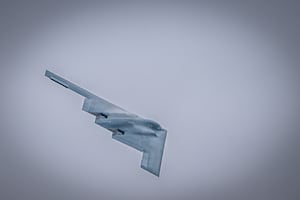Iran has vowed to respond to US strikes on its nuclear sites but signalled on Sunday it is not shutting the door on diplomacy.
Foreign Minister Abbas Araghchi, speaking at an emergency meeting of the Organisation of Islamic Co-operation (OIC) in Istanbul, accused Washington of “betraying diplomacy” by enabling Israeli attacks on Iranian nuclear sites, then launching direct strikes of its own.
“They crossed a very big red line,” Mr Araghchi said. “I don’t know how much space is left for diplomacy. We are now assessing the damage but my country has been attacked – and we will respond.”
Despite the warning, Mr Araghchi said Iran remained open to negotiations: “The door to diplomacy must remain open."
Iranian President Masoud Pezeshkian took part in a protest in Tehran to denounce the US strikes. An aide to supreme leader Ayatollah Ali Khamenei meanwhile warned that any Middle East base used to strike Iran could be a target for retaliation.
"Any country in the region or elsewhere that is used by American forces to strike Iran will be considered a legitimate target," Ali Akbar Velayati said. The Pentagon said no such bases were used in Sunday's strikes as bombers took off from the US mainland.
The US has signalled that its military operation is complete. Officials in Washington have portrayed the strikes as limited, aimed at containing Iran’s nuclear programme, not toppling the regime.
It marked a dramatic turn after days of debate over whether the Donald Trump administration would join the Israel-Iran conflict directly.
Tehran, however, sees the strikes as a co-ordinated escalation. Mr Araghchi said the US had given Israel the “green light” to launch its initial attacks, and then followed up with its own, breaking any diplomatic trust that remained.
'Regrettable consequences'
For its part, Iran’s Islamic Revolutionary Guard Corps (IRGC) announced it would continue “Operation True Promise 3”, a retaliatory campaign it claims has already involved 20 waves of strikes on Israeli targets.
“In response to this aggression and crime, Operation True Promise 3 will continue in a precise, focused and devastating manner, targeting the regime's infrastructure, strategic centres and interests,” an IRGC statement read.
It warned that US military bases across the region are now "liabilities". The statement added: “The aggression by the terrorist US regime has opened the path to responses that go beyond the delusional calculations of the aggressor front. The invaders of this land should expect regrettable consequences."
At least nine members of the IRGC were killed on Sunday in Israeli attacks on central Iran, local media reported. Attacks on two military centres in the city of Yazd killed seven IRGC personnel and two conscripts, the Tasnim news agency said. Blasts were also heard on Sunday in Tehran, as fighting between Israel and Iran continued for a 10th day.
The strikes have raised fears of wider escalation across the Middle East. Iran has long threatened to target US military assets or close the strategic Strait of Hormuz if attacked directly.
While Tehran’s network of regional proxy groups has been weakened in recent years, officials suggest that channel remains a possible avenue for retaliation.
Mr Araghchi said Tehran is evaluating its response options but suggested Iran would not rush into an all-out conflict.
The developments come amid rising global concern over the potential collapse of the nuclear non-proliferation framework and the further destabilisation of a region already strained by a number of crises.
Venom
Director: Ruben Fleischer
Cast: Tom Hardy, Michelle Williams, Riz Ahmed
Rating: 1.5/5
Neil Thomson – THE BIO
Family: I am happily married to my wife Liz and we have two children together.
Favourite music: Rock music. I started at a young age due to my father’s influence. He played in an Indian rock band The Flintstones who were once asked by Apple Records to fly over to England to perform there.
Favourite book: I constantly find myself reading The Bible.
Favourite film: The Greatest Showman.
Favourite holiday destination: I love visiting Melbourne as I have family there and it’s a wonderful place. New York at Christmas is also magical.
Favourite food: I went to boarding school so I like any cuisine really.
The specs
Engine: 2.0-litre 4cyl turbo
Power: 261hp at 5,500rpm
Torque: 405Nm at 1,750-3,500rpm
Transmission: 9-speed auto
Fuel consumption: 6.9L/100km
On sale: Now
Price: From Dh117,059
more from Janine di Giovanni
Fifa Club World Cup quarter-final
Esperance de Tunis 0
Al Ain 3 (Ahmed 02’, El Shahat 17’, Al Ahbabi 60’)
The specs
Engine: four-litre V6 and 3.5-litre V6 twin-turbo
Transmission: six-speed and 10-speed
Power: 271 and 409 horsepower
Torque: 385 and 650Nm
Price: from Dh229,900 to Dh355,000
A%20QUIET%20PLACE
%3Cp%3E%3Cstrong%3EStarring%3A%3C%2Fstrong%3E%20Lupita%20Nyong'o%2C%20Joseph%20Quinn%2C%20Djimon%20Hounsou%3C%2Fp%3E%0A%3Cp%3E%3Cstrong%3EDirector%3A%20%3C%2Fstrong%3EMichael%20Sarnoski%3C%2Fp%3E%0A%3Cp%3E%3Cstrong%3ERating%3A%3C%2Fstrong%3E%204%2F5%3C%2Fp%3E%0A
The%20specs%3A%20Taycan%20Turbo%20GT
%3Cp%3E%3Cstrong%3EEngine%3A%20%3C%2Fstrong%3EDual%20synchronous%20electric%20motors%0D%3Cbr%3E%3Cstrong%3EPower%3A%20%3C%2Fstrong%3E1%2C108hp%0D%3Cbr%3E%3Cstrong%3ETorque%3A%20%3C%2Fstrong%3E1%2C340Nm%0D%3Cbr%3E%3Cstrong%3ETransmission%3A%20%3C%2Fstrong%3ESingle-speed%20automatic%20(front%20axle)%3B%20two-speed%20transmission%20(rear%20axle)%0D%3Cbr%3E%3Cstrong%3ETouring%20range%3A%20%3C%2Fstrong%3E488-560km%0D%3Cbr%3E%3Cstrong%3EPrice%3A%20%3C%2Fstrong%3EFrom%20Dh928%2C400%0D%3Cbr%3E%3Cstrong%3EOn%20sale%3A%20%3C%2Fstrong%3EOrders%20open%3C%2Fp%3E%0A
AWARDS
%3Cp%3E%3Cstrong%3EBest%20Male%20black%20belt%3A%20%3C%2Fstrong%3ELucas%20Protasio%20(BRA)%3Cbr%3E%3Cstrong%3EBest%20female%20black%20belt%3A%20%3C%2Fstrong%3EJulia%20Alves%20(BRA)%3Cbr%3E%3Cstrong%3EBest%20Masters%20black%20belt%3A%3C%2Fstrong%3E%20Igor%20Silva%20(BRA)%3Cbr%3E%3Cstrong%3EBest%20Asian%20Jiu-Jitsu%20Federation%3A%3C%2Fstrong%3E%20Kazakhstan%3Cbr%3E%3Cstrong%3EBest%20Academy%20in%20UAE%3A%20%3C%2Fstrong%3ECommando%20Group%2C%20Abu%20Dhabi%3Cbr%3E%3Cstrong%3EBest%20International%20Academy%3A%3C%2Fstrong%3E%20Commando%20Group%2C%20Abu%20Dhabi%3Cbr%3E%3Cstrong%3EAfrican%20Player%20of%20the%20Year%3A%20%3C%2Fstrong%3EKatiuscia%20Yasmira%20Dias%20(GNB)%3Cbr%3E%3Cstrong%3EOceanian%20Player%20of%20the%20Year%3A%20%3C%2Fstrong%3EAnton%20Minenko%20(AUS)%3Cbr%3E%3Cstrong%3EEuropean%20Player%20of%20the%20Year%3A%3C%2Fstrong%3E%20Rose%20El%20Sharouni%20(NED)%3Cbr%3E%3Cstrong%3ENorth%20and%20Central%20American%20Player%20of%20the%20Year%3A%20%3C%2Fstrong%3EAlexa%20Yanes%20(USA)%3Cbr%3E%3Cstrong%3EAsian%20Player%20of%20the%20Year%3A%20%3C%2Fstrong%3EZayed%20Al%20Katheeri%20(UAE)%3Cbr%3E%3Cstrong%3ERookie%20of%20the%20Year%3A%3C%2Fstrong%3E%20Rui%20Neto%20(BRA)Rui%20Neto%20(BRA)%3C%2Fp%3E%0A
From Europe to the Middle East, economic success brings wealth - and lifestyle diseases
A rise in obesity figures and the need for more public spending is a familiar trend in the developing world as western lifestyles are adopted.
One in five deaths around the world is now caused by bad diet, with obesity the fastest growing global risk. A high body mass index is also the top cause of metabolic diseases relating to death and disability in Kuwait, Qatar and Oman – and second on the list in Bahrain.
In Britain, heart disease, lung cancer and Alzheimer’s remain among the leading causes of death, and people there are spending more time suffering from health problems.
The UK is expected to spend $421.4 billion on healthcare by 2040, up from $239.3 billion in 2014.
And development assistance for health is talking about the financial aid given to governments to support social, environmental development of developing countries.
New UK refugee system
- A new “core protection” for refugees moving from permanent to a more basic, temporary protection
- Shortened leave to remain - refugees will receive 30 months instead of five years
- A longer path to settlement with no indefinite settled status until a refugee has spent 20 years in Britain
- To encourage refugees to integrate the government will encourage them to out of the core protection route wherever possible.
- Under core protection there will be no automatic right to family reunion
- Refugees will have a reduced right to public funds
The%20specs
%3Cp%3E%3Cstrong%3EEngine%3A%20%3C%2Fstrong%3E77kWh%202%20motors%0D%3Cbr%3E%3Cstrong%3EPower%3A%20%3C%2Fstrong%3E178bhp%0D%3Cbr%3E%3Cstrong%3ETorque%3A%20%3C%2Fstrong%3E410Nm%0D%3Cbr%3E%3Cstrong%3ERange%3A%20%3C%2Fstrong%3E402km%0D%3Cbr%3E%3Cstrong%3EPrice%3A%20%3C%2Fstrong%3EDh%2C150%2C000%20(estimate)%0D%3Cbr%3E%3Cstrong%3EOn%20sale%3A%20%3C%2Fstrong%3ETBC%3C%2Fp%3E%0A
BMW M5 specs
Engine: 4.4-litre twin-turbo V-8 petrol enging with additional electric motor
Power: 727hp
Torque: 1,000Nm
Transmission: 8-speed auto
Fuel consumption: 10.6L/100km
On sale: Now
Price: From Dh650,000
How to apply for a drone permit
- Individuals must register on UAE Drone app or website using their UAE Pass
- Add all their personal details, including name, nationality, passport number, Emiratis ID, email and phone number
- Upload the training certificate from a centre accredited by the GCAA
- Submit their request
What are the regulations?
- Fly it within visual line of sight
- Never over populated areas
- Ensure maximum flying height of 400 feet (122 metres) above ground level is not crossed
- Users must avoid flying over restricted areas listed on the UAE Drone app
- Only fly the drone during the day, and never at night
- Should have a live feed of the drone flight
- Drones must weigh 5 kg or less
Electoral College Victory
Trump has so far secured 295 Electoral College votes, according to the Associated Press, exceeding the 270 needed to win. Only Nevada and Arizona remain to be called, and both swing states are leaning Republican. Trump swept all five remaining swing states, North Carolina, Georgia, Pennsylvania, Michigan and Wisconsin, sealing his path to victory and giving him a strong mandate.
Popular Vote Tally
The count is ongoing, but Trump currently leads with nearly 51 per cent of the popular vote to Harris’s 47.6 per cent. Trump has over 72.2 million votes, while Harris trails with approximately 67.4 million.
Getting there
Flydubai flies direct from Dubai to Tbilisi from Dh1,025 return including taxes
SPEC%20SHEET%3A%20NOTHING%20PHONE%20(2)
%3Cp%3E%3Cstrong%3EDisplay%3A%3C%2Fstrong%3E%206.7%E2%80%9D%20LPTO%20Amoled%2C%202412%20x%201080%2C%20394ppi%2C%20HDR10%2B%2C%20Corning%20Gorilla%20Glass%3C%2Fp%3E%0A%3Cp%3E%3Cstrong%3EProcessor%3A%3C%2Fstrong%3E%20Qualcomm%20Snapdragon%208%2B%20Gen%202%2C%20octa-core%3B%20Adreno%20730%20GPU%3C%2Fp%3E%0A%3Cp%3E%3Cstrong%3EMemory%3A%3C%2Fstrong%3E%208%2F12GB%3C%2Fp%3E%0A%3Cp%3E%3Cstrong%3ECapacity%3A%3C%2Fstrong%3E%20128%2F256%2F512GB%3C%2Fp%3E%0A%3Cp%3E%3Cstrong%3EPlatform%3A%3C%2Fstrong%3E%20Android%2013%2C%20Nothing%20OS%202%3C%2Fp%3E%0A%3Cp%3E%3Cstrong%3EMain%20camera%3A%3C%2Fstrong%3E%20Dual%2050MP%20wide%2C%20f%2F1.9%20%2B%2050MP%20ultrawide%2C%20f%2F2.2%3B%20OIS%2C%20auto-focus%3C%2Fp%3E%0A%3Cp%3E%3Cstrong%3EMain%20camera%20video%3A%3C%2Fstrong%3E%204K%20%40%2030%2F60fps%2C%201080p%20%40%2030%2F60fps%3B%20live%20HDR%2C%20OIS%3C%2Fp%3E%0A%3Cp%3E%3Cstrong%3EFront%20camera%3A%3C%2Fstrong%3E%2032MP%20wide%2C%20f%2F2.5%2C%20HDR%3C%2Fp%3E%0A%3Cp%3E%3Cstrong%3EFront%20camera%20video%3A%3C%2Fstrong%3E%20Full-HD%20%40%2030fps%3C%2Fp%3E%0A%3Cp%3E%3Cstrong%3EBattery%3A%3C%2Fstrong%3E%204700mAh%3B%20full%20charge%20in%2055m%20w%2F%2045w%20charger%3B%20Qi%20wireless%2C%20dual%20charging%3C%2Fp%3E%0A%3Cp%3E%3Cstrong%3EConnectivity%3A%3C%2Fstrong%3E%20Wi-Fi%2C%20Bluetooth%205.3%2C%20NFC%20(Google%20Pay)%3C%2Fp%3E%0A%3Cp%3E%3Cstrong%3EBiometrics%3A%3C%2Fstrong%3E%20Fingerprint%2C%20face%20unlock%3C%2Fp%3E%0A%3Cp%3E%3Cstrong%3EI%2FO%3A%3C%2Fstrong%3E%20USB-C%3C%2Fp%3E%0A%3Cp%3E%3Cstrong%3EDurability%3A%3C%2Fstrong%3E%20IP54%2C%20limited%20protection%3C%2Fp%3E%0A%3Cp%3E%3Cstrong%3ECards%3A%3C%2Fstrong%3E%20Dual-nano%20SIM%3C%2Fp%3E%0A%3Cp%3E%3Cstrong%3EColours%3A%3C%2Fstrong%3E%20Dark%20grey%2C%20white%3C%2Fp%3E%0A%3Cp%3E%3Cstrong%3EIn%20the%20box%3A%3C%2Fstrong%3E%20Nothing%20Phone%20(2)%2C%20USB-C-to-USB-C%20cable%3C%2Fp%3E%0A%3Cp%3E%3Cstrong%3EPrice%20(UAE)%3A%3C%2Fstrong%3E%20Dh2%2C499%20(12GB%2F256GB)%20%2F%20Dh2%2C799%20(12GB%2F512GB)%3C%2Fp%3E%0A
The specs: Fenyr SuperSport
Price, base: Dh5.1 million
Engine: 3.8-litre twin-turbo flat-six
Transmission: Seven-speed automatic
Power: 800hp @ 7,100pm
Torque: 980Nm @ 4,000rpm
Fuel economy, combined: 13.5L / 100km
Leap of Faith
Michael J Mazarr
Public Affairs
Dh67
The Vile
Starring: Bdoor Mohammad, Jasem Alkharraz, Iman Tarik, Sarah Taibah
Director: Majid Al Ansari
Rating: 4/5
'Falling%20for%20Christmas'
%3Cp%3EDirector%3A%20Janeen%20Damian%3Cbr%3E%3Cbr%3EStars%3A%20Lindsay%20Lohan%2C%20Chord%20Overstreet%2C%20Jack%20Wagner%2C%20Aliana%20Lohan%3Cbr%3E%3Cbr%3ERating%3A%201%2F5%3C%2Fp%3E%0A
Brief scores:
Toss: Northern Warriors, elected to field first
Bengal Tigers 130-1 (10 ov)
Roy 60 not out, Rutherford 47 not out
Northern Warriors 94-7 (10 ov)
Simmons 44; Yamin 4-4
How to wear a kandura
Dos
- Wear the right fabric for the right season and occasion
- Always ask for the dress code if you don’t know
- Wear a white kandura, white ghutra / shemagh (headwear) and black shoes for work
- Wear 100 per cent cotton under the kandura as most fabrics are polyester
Don’ts
- Wear hamdania for work, always wear a ghutra and agal
- Buy a kandura only based on how it feels; ask questions about the fabric and understand what you are buying
The specs: 2018 Jeep Compass
Price, base: Dh100,000 (estimate)
Engine: 2.4L four-cylinder
Transmission: Nine-speed automatic
Power: 184bhp at 6,400rpm
Torque: 237Nm at 3,900rpm
Fuel economy, combined: 9.4L / 100km


